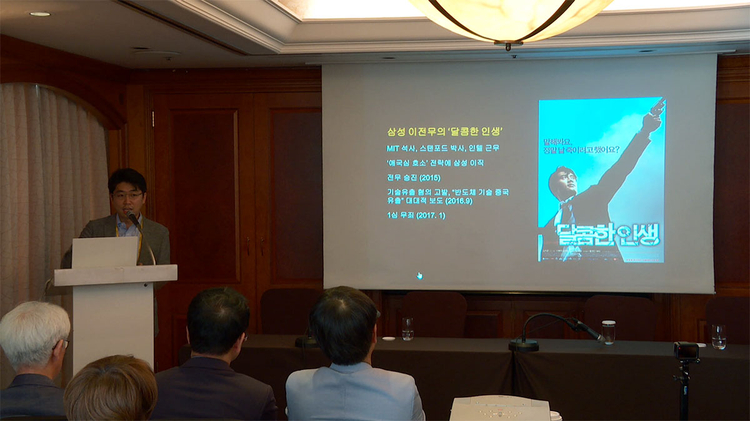
Where Should Korean Investigative Journalism Head to?
2018년 10월 08일 17시 13분
[This article was written by student reporters of IJAsia18.]
Uncovering Asia 2018, the third Asian Investigative Journalism Conference, kicked off on Oct. 5, 2018 in Seoul, South Korea, to offer Asian reporters a chance to exchange information and develop possibilities of cross-border investigations. Here is a brief overview of the first day of IJAsia18.
The Global Investigative Journalism Network(GIJN), the Korea Center for Investigative Journalism(KCIJ)-Newstapa, and the Konrad-Adenauer-Stiftung(KAS) hosts its biennial conference at the Millennium Seoul Hilton from Oct. 5 to 7, 2018.
The conference aims to promote investigative journalism, receiving with 429 prominent journalists from 48 countries. It focuses on providing a novel opportunity of imbibing insights through 54 sessions and encouraging engagements between reporters.
Yongjin Kim, Editor-in-Chief of KCIJ-Newstapa, stressed that the global network -- which he explained is growing than ever -- is key in investigative journalism at his opening remarks.
“We believe in the importance of investigative journalism to want to make the world a bright place,” Kim said, adding that it contributes to enhancing democracy at the end of the day as investigative journalism is crucial for every democracy.
David Kaplan, Executive Director of GIJN, highlighted that cross-border cooperation between journalists is key to effective investigative journalism, adding that the conference aims to build networking infrastructure to help media organizations across the world to collaborate in cross-border investigations.
He encouraged the attendees to think of the Asian conference as a “big buffet” which encourages development of cross-border story ideas.
“The real action happens in the hallways and at lunch as much as it does in the panels and the workshop,” Kaplan said.
Attendees had ample time between sessions to interact with one another to cultivate opportunities for collaboration, and were already eagerly sharing their work, ideas and stories. Christoph Grabitz, Director of the Media Program KAS Asia, echoed how the attendees were buzzed with productive energy on Twitter.
Themes of the first-day’s sessions varied widely, from data journalism and covering corruption to journalism in China and the in-depth discussion regarding the peacemaking process of the Korean Peninsula.
First day of the three-day conference started out with the plenary session, which discussed new and diverse threats that Asian journalists have contended with. The session featured prominent journalists working on the frontlines of censorship and political pressure in various Asian countries, such as Rappler CEO and Executive Editor Maria Ressa of the Philippines, Malaysiakini Co-founder & Editor-in-chief Steven Gan of Malaysia, and NDTV Managing Editor Sreenivasan Jain of India.
Jain discussed propagandization of the Indian media increasing partisan hostility that frames media as dishonest and a force of evil, while Ressa brought up an issue of social media attacks and trolls in the Philippines. The speakers reiterated that facing these threats requires the construction of a strong global network of committed journalists.
Following is some of interesting sessions of the day:
The State of Data Journalism in China. Data Journalism Co-founder and Editor Yolanda Ma discussed the challenges and opportunities of data journalism in China. Most attendees of the session were journalists based in the Greater China region, but foreign journalists also attended to learn more about the enormous Chinese content market with more than 800 million internet users.
“Increasingly more data is being made available to us as the Chinese government is building data disclosure infrastructure and more internet giants like Weibo and Taobao are sharing data about their users,” Jolly Shen, Project Leader of The Rising Lab said.
Covering Conflict in Conflict Zones. Moderated by Maria Ronderos, who reported on Colombia's bloody years-long conflict, the session was packed with horrific and heavy imagery from Maria Abi-habib and Namini Wijedasa, two journalists who covered terrorism in the Middle East and the Sri Lankan civil war respectively. Ronderos explained that covering conflict was more nuanced and complex than descriptions of warfare.
“I hate writing about running away from Taliban bullets and explosions,” she said. “That silly bravado doesn’t help readers understand why conflicts happen and the reasons conflict perpetuates, usually money - soldiers are often the last ones standing and will trade their fatigues for versace suits.”
Inside the Korean Peace Process. After months of more-risky-than-ever inter-Korean relations, the two Koreas recently seem to have reached at a point where they find and pave a way to maintain a peace. During the Inside the Korean Peace Process session, three veteran correspondents - Moonhee Nam of SisaIN, Chulyong Keum of Korea Broadcasting System(KBS) and Eric Talmadge of Associated Press Pyongyang bureau- got together to provide behind-the-scenes stories of issues regarding Korean peace talk. The epitome of today’s session can be summarized in a sentence: denuclearization of Democratic People’s Republic of Korea (DPRK) is no longer an impossible task.
The conference will continue for the next two days with more interesting sessions that conference-goers will be able to choose from: Exposing Fake News & Propaganda; Cross-Border Investigations: Exposing Human Slavery; Investigative Radio & Podcasts and Finding Data: From Asia & the World.
The second day will close with a gala event featuring the conference keynote speaker, renowned Malaysian political cartoonist Zunar, who was sentenced with 43 years in jail after publishing cartoon that criticizes a number of political figures.

report: Chaeun Moon, Jasen Lo
뉴스타파는 권력과 자본의 간섭을 받지 않고 진실만을 보도하기 위해, 광고나 협찬 없이 오직 후원회원들의 회비로만 제작됩니다. 월 1만원 후원으로 더 나은 세상을 만들어주세요.